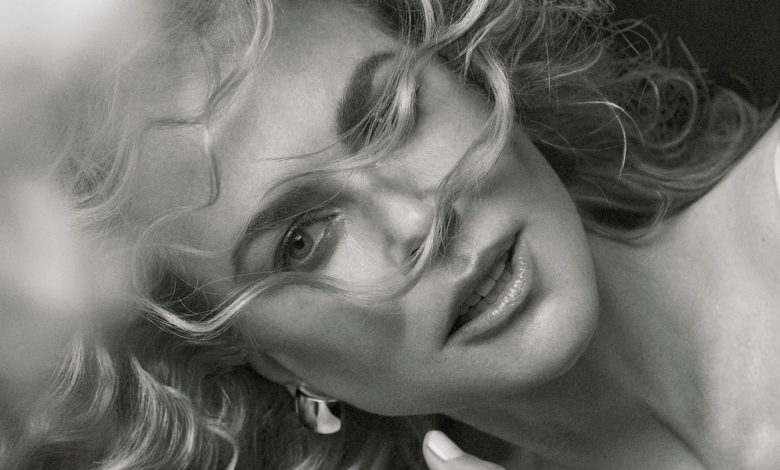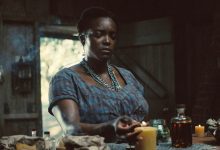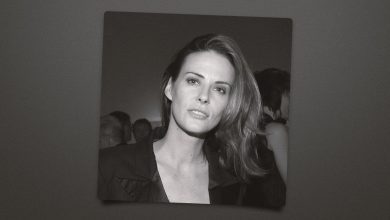Nicole Kidman Exposed

Nicole Kidman’s new film, Babygirl, opens with a scene moviegoers may think they have seen many times before — an actress having a very pretty orgasm. For a global movie star with five Oscar nominations and two Emmys, you might even consider the opening risqué. But it’s what follows that reveals Kidman to be in fresh cinematic territory and why she calls this role “a calling.” In subsequent scenes, director Halina Reijn divulges that the intended audience for the opening breathy performance had been the character’s handsome, loving husband (Antonio Banderas) — and Kidman delivers other, much more feral climaxes without him. In the A24 movie, a gender-flipped love letter to erotic thrillers like 9½ Weeks and Basic Instinct, Kidman plays a powerful CEO, wife and mother whose attraction to a brazen young male intern (Harris Dickinson) threatens to blow up her Instagram-perfect life.
Photographed by Alique
It’s a bracingly vulnerable performance, provocative even for the woman who raised eyebrows 25 years ago with Eyes Wide Shut, and a role that caps a year in which Kidman is, seemingly, everywhere. Her six 2024 projects include the soapy Netflix murder mystery The Perfect Couple, which became the most watched original streaming series in the U.S. in September; the Taylor Sheridan spy thriller series Lioness on Paramount+; and Lulu Wang’s prestige drama series for Amazon Prime, Expats. The crush of output is thanks in part to a scheduling quirk caused by the 2023 SAG-AFTRA strike, but it also reflects the rarefied position in which Kidman finds herself at age 57, more in demand than ever.
While much of Hollywood seems to have seen the hiring of more women in roles of creative leadership as a post-#MeToo talking point, Kidman has taken on the task in earnest, working with a stunning 21 female directors in the past seven years as an actress or a producer. “She is one of the few people who practices what she preaches when it comes to feminism and empowering women,” Reijn says. She also has locked arms with female co-producers like Reese Witherspoon on HBO’s Big Little Lies and Jamie Lee Curtis, who is producing the upcoming Amazon Prime series Scarpetta, in which Kidman plays the title character from Patricia Cornwell’s book series about a medical examiner. (“I’m learning all about autopsies,” Kidman says. “I know where all the body parts are.”)
Kidman, who is being honored with The Hollywood Reporter’s Sherry Lansing Leadership Award for her professional and philanthropic contributions, paused her breakneck schedule to talk with THR from the home in Nashville that she shares with her husband, country musician Keith Urban, and daughters Sunday, 16, and Faith, 14, about why Babygirl felt so “dangerous” to make, what her agent told her at age 40 that she didn’t believe and what she does with her — no kidding — downtime.
Brandon Maxwell gown; Wempe jewelry. Photographed by Alique
You described this movie to me as “a calling.” What was the calling?
A lot of times women are discarded at a certain period of their career as a sexual being. So it was really beautiful to be seen in this way. From the minute I read it, I was like, “Yeah, this is a voice I haven’t seen, this is a place that I haven’t been, I don’t think audiences have been.” My character has reached a stage where she’s got all this power, but she’s not sure who she is, what she wants, what she desires, even though she seems to have it all. And I think that’s really relatable. There are many women who are going, “Well, I’ve done this, I’ve got children, I’ve got this husband, and what do I actually want? Who am I and what are my desires? Do I have to pretend to be something else for people to love me?” I think it’s very releasing, this film. I hope it is. I’ve had some people say it’s the most disturbing film they’ve ever seen, which I’m like, “Oh no, I’m so sorry.”
I saw the movie in a tiny screening room in West Hollywood, and afterward some older women in the ladies’ room asked me to explain some things. I felt unequipped for the conversation. I suggested some things for them to Google.
What were they asking you to explain?
Why your character was turned on by certain things. Like by a guy getting a misbehaving dog to heel.
The dog is a metaphor about the beast within us. It’s kind of amazing that the women are asking that. That’s the representation of what you are taming within you. A lot of it is about power and what that does to you sexually.
Gucci bra; Wempe jewelry. Photographed by Alique
There’s a very memorable sequence where Harris Dickinson’s character lifts you in a bathrobe while the George Michael song “Father Figure” plays. I’m pretty sure this will be your next meme.
I love that [director Halina Reijn] put me in the bathrobe in that scene, and it’s not a silk bathrobe, it’s a terry. I was like, “Yes, let me sit in this chair and he can dance.” It’s a twist on 9½ Weeks, and then it’s also a bit messy. It was confronting for me, which I love. I was like, “Golly, OK.”
Do you consider it a compliment to be memed?
Of course. You’ve got to let go and be able to make fun of yourself. It’s very much an Australian trait, but I think it’s a necessary trait for life. I know who I am. I try to stay deeply focused on my authentic self and stay with that. Everything else is beyond my control. But let’s wait and see what happens with the [memes from] Babygirl. I may be terribly upset the next time you talk to me.
I watched Keith’s speech at your AFI tribute last spring, and he closed it by calling you “babygirl.” Is this a word that had meaning to you before you got this script?
Even though the word “babygirl” now is used to describe men, right? [Editor’s note for our less chronically online readers: “Babygirl” is TikTok slang for an attractive man.] Babygirl is something that Keith has always used for me. That is separate. That stays in a separate compartment, that’s not up for public consumption. But then when I read it, I was like, “I’ve not read a film like this.” I thought it was incredibly sexy. Really just so raw and dangerous, and I couldn’t believe they were giving us the money to make it.
What felt to you the most dangerous part of it?
The sexuality of it. That it wasn’t written for a 20-year-old. It wasn’t written even for a 30-year-old.
Brandon Maxwell gown; Wempe jewelry. Photographed by Alique
How did you figure out how to play the different types of orgasms in the movie?
(Kidman covers her face with both hands.) I blush, still! That’s insane. But that’s a good thing, I suppose. I’m very interested in exploring those things, but I’m not that extroverted. I was so in character. To pull the curtain back on all of it, it’s too sacred.
Well, let’s try to pull back the curtain a little. The movie starts with what I’ll call a “Hollywood orgasm” with her husband, meaning it’s all about the presentation, all for him. Later, we see orgasms where she’s not worried what anyone thinks of her, and they look and sound very different.
Those ones may not look pretty or sound pretty. Or be what we think is pretty. Halina has always wanted to do something like this. That’s probably why we constantly say we need women in all areas of filmmaking, telling different stories. It’s not just to be more fair. It’s actually because it’s kind of fascinating. And for people to feel, “I can be who I am.” I want people to go see this in the cinema, not just clicking on this at home, secretly, watching it in their own little secret way. There’s something extraordinary about seeing it with a group of people.
Gucci bra; Wempe jewelry. Photographed by Alique
There’s a sequence in Babygirl where your character is undergoing all these different treatments — the cold plunge, the Botox. What did that sequence signify to you?
She’s doing everything to go, “Help me to be what I think I should be, help me be normal. Help me keep up with what I need to be. I’m fighting this losing battle.” [In a later scene,] she’s trying to say, “This is who I am. I’ve tried to be everything you wanted me to be, and I can’t, and will you love me anyway?”
What determines the type of roles that you say yes to right now?
You always feel there’s a limited amount of time, and I’m trying to share what I have. The industry, it feels like there’s always this clock. I’m also raising my daughters and I have my marriage. I have a lot of girlfriends. I have a very, very tight family and not just my immediate family. I have my sister, who’s about to arrive over here from Australia to Nashville for Thanksgiving. She has six kids. They’re all coming. Her niece is already here with her boyfriend staying with us.
To Stellan Skarsgard, whom I worked with on Dogville, I said, “How do you do it?” Because a lot of the Europeans work a lot, and he particularly does, but he has so many kids. He goes, “They come with me and we create a home and we bring people in and we all live together and we’re on the adventure together.” That’s sort of what I do. I incorporate my family into it. And because I have a musician husband, he’s got that slightly nomadic thing as well. So he’s not someone that goes, “No, I have to stay here. I can’t move.” My girls, I’ve always said, “You are of the world, you’re global children.” That’s what we do as a family. We travel and we experience things. And that’s a great education, too.
Brandon Maxwell gown; Wempe jewelry. Photographed by Alique
Is there a Kidman-Urban Google family calendar?
No, we have breakfast together every morning, and we have dinner. How do we do it? I’m kind of not sure. We talk a lot. I also go home early from parties. If you don’t go out a lot, I think you have a lot more time than you realize. So I don’t say yes to many things, events and things like that.
You’re probably not scrolling TikTok all day.
I’ve never been on TikTok. I have people around me that go, “Did you see this on TikTok?” So then they’ll show me a couple of seconds of it, and I’ll be like, “Oh my God. That’s so funny.”
What is your relationship to social media in general?
Ten minutes a day. What’s yours?
Uh … more than that. A mortifying amount of time.
Don’t you have the timer?
I ignore the timer.
You ignore the timer?! I’m just not, my psyche’s not, I can’t handle that stuff.
Oscar de la Renta fringe dress; Wempe jewelry. Photographed by Alique
What do you still want to do with your time?
I might do a play. I would like to hike Machu Picchu. I want to go skiing, so I have to not be filming to ski. I love hiking in Austria. My husband and I want to go do that. And then we want to take the girls to Japan on spring break. And lots of swimming in the ocean. I find the ocean very, very soothing. I just love the magnitude of it; it puts everything into perspective for me. But I also love mountains. The one thing that I find torturous is if I’m held captive in a room and I can’t get out for 24 hours. I just need fresh air, I need to get out and be able to walk. They call it forest bathing.
And are you able to do all that as a public figure?
I’m about to go forest bathing right now, taking my niece up into the mountains here [in Tennessee].
I am sorry about your loss of your mom this year. What was she like?
She was always the smartest person in the room. She would challenge you on all your ideas or your work. I was sad she didn’t get to see Babygirl. She just had an enormous amount of wisdom and humor, very irreverent. She would see through everything. And she’d always say to me that I was always looking at the world with rose-colored glasses.
Your mom’s generation of women was not necessarily encouraged to have professional ambition. Were there things she wanted to do but wasn’t able to?
Definitely. Which is sad, but she shared all of that with us and put it into her daughters [Kidman’s sister, Antonia, is a journalist turned lawyer]. And she loved my career. She’d go, “That was very good,” or, “The writing on this wasn’t good.” When she said something was good, you just sort of almost fell at her feet. Growing up, she would take me to the opera. She knew so much about art. I came from that very academic home where it was like, “Well, where’s your degree?” And I’m like, “I got my degree in acting.” We would read novels and then we would discuss them, or we would discuss an art exhibition.
I interviewed you in 2010 when you had Rabbit Hole coming out and you were just starting to produce. One thing I remember was that you had gotten involved with making sure there would be enough porta-potties on set. That seemed unusually hands-on. Now that we’re 13, 14 years down the road, how has your style as a producer changed?
I’m what you need me to be. I didn’t produce Babygirl. I’m an actor that was offered a role. But scrappy filmmaking, I know how to do that. You’ve got to have a sense of a schedule and taking care of a crew. That’s just become innate. On Babygirl, [to save money] we were shooting in the A24 offices.
Bottega Veneta dress; Wempe jewelry. Photographed by Alique
In the decade-plus since Rabbit Hole, you’ve had a very, very busy era as an actress, which also feels unusual. You were in your early 40s …
I had my baby, Sunday, who’s 16 now. It was at that crossroads, actually, where you go, “Oh, I’m either going to drift away now or things will solidify.” You were told to retire at a certain age. Things are changing now, don’t you think? Doors are opening. People are living longer and there’s more to be said, and more stories to be told. There’s women’s medicine, which we’re able to now have access to in a better way where we know what’s happening to ourselves. It’s about whether you still feel vibrant and alive. And that has a lot to do with nourishing your soul and staying in a place of curiosity and not sleepy. Dreamy is good, but not sleepy.
My agent, Kevin Huvane, when I was 40, was like, “It’s not over, Nicole. It’s going to begin now.” And I was like, “What? No, I think it’s over,” and he’s like, “Uh-uh.” He’s Meryl’s agent. I also have a lot of support. I have a producing partner [Blossom Films’ Per Saari]. My husband is a massive part of who I am, and my daughters. My daughters are huge, huge contributors to things in my life, and they open my eyes to things, and I just did an interview with … Do you know the Chicken Nugget Girl?
The Chicken Shop Date girl, yes.
(Laughs.) Yes, Amelia [Dimoldenberg]. I did an interview with her, and my daughter was like, “Oh my gosh! You are kidding!” I was like, “Whoa.” Amelia is quick. She’s smart. I know a lot about the way in which that generation thinks, even though they don’t let me in on all of it, but it’s definitely a different lens. I think that is what Halina Reijn was interested in, too. When she directed [the Gen Z satire] Bodies Bodies Bodies, suddenly she was around so many of these young people who were teaching her, which is why young people teaching an older person is in Babygirl. You can be a mentor, and you can be mentored by younger people.
Sunday recently walked in her first fashion show at 16, for Miu Miu. What was that like for you as a mom?
That’s all driven by her. Me going, “Oh no, I don’t think so.” But Miuccia [Prada] just loved her and was like, “No, I want her.” And Miuccia is so powerful as a woman. So that was a good match. I sat with Miuccia recently in Italy and said, “My gosh, I’ve known you since I was about 23.” I’ve been in this industry for a while.
That’s why this Sherry Lansing Award — Sherry Lansing is pretty much the first female executive I met when I came to America. She was right there at Paramount, and she was so powerful. She was a nurturer. She gave me so much attention and space and belief. She goes, “You’re going to have an incredible career.” “Really? You think? But I’m Australian.” It’s very intimidating when you come to America from Australia. You go, “Oh my gosh, this is big time.” But she was like, “Yes, I know it.” I didn’t believe her. So now I’ll get up there and say, “I believe you now, Sherry.”
This story appeared in the Dec. 4 issue of The Hollywood Reporter magazine. Click here to subscribe.
Source: Hollywoodreporter
Related Posts
- Roundball Rocked: With NBA Return Looming, NBC Purges Scripted Roster
- SoundCloud Says It “Has Never Used Artist Content to Train AI Models” After Backlash on Terms of Service Change
- Fox News’ Camryn Kinsey Is “Doing Well” After Fainting on Live TV
- Kerry Washington and Jahleel Kamera in 'Shadow Force.'
Courtesy of Lionsgate
…
- This Alternative Artist Landed a Top-20 Chart Debut With an Album Made Almost Entirely on His Phone





